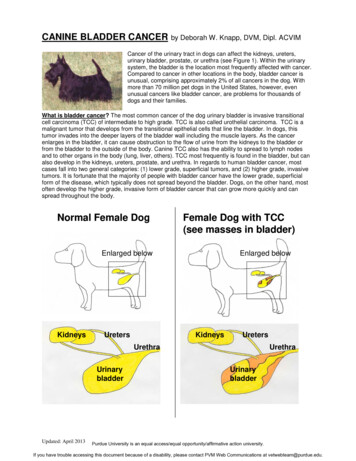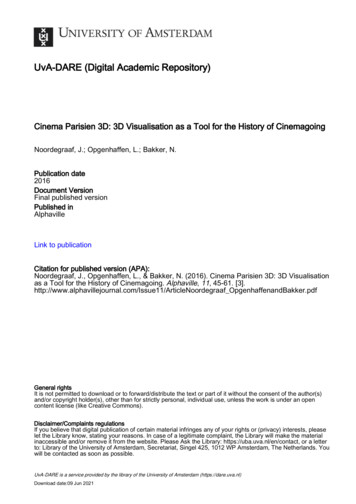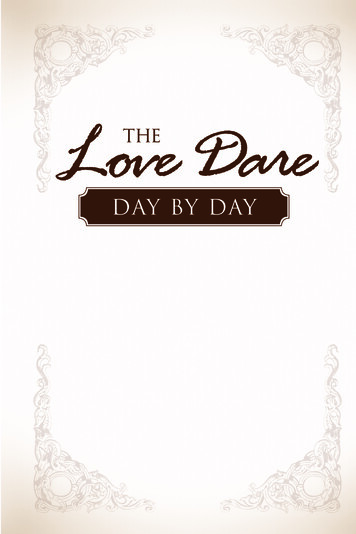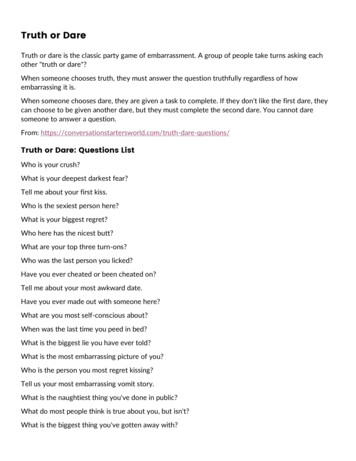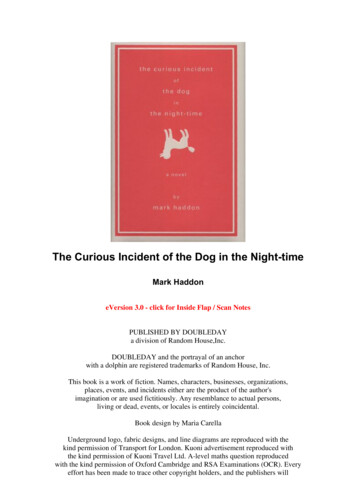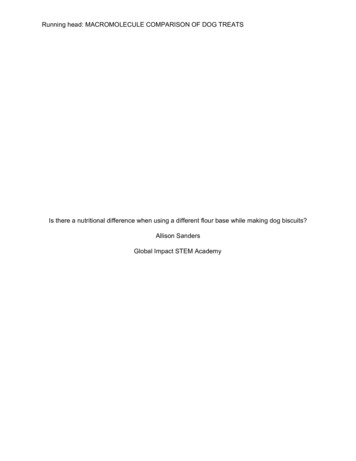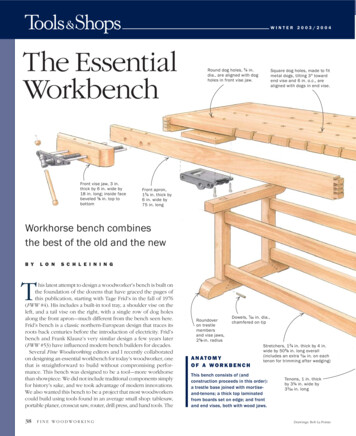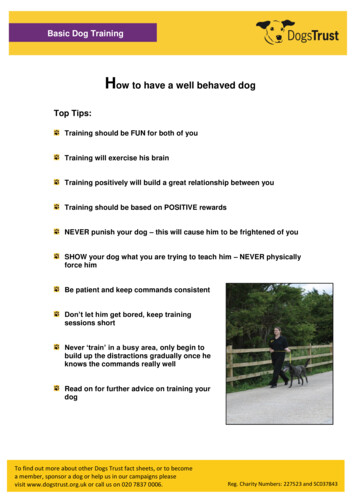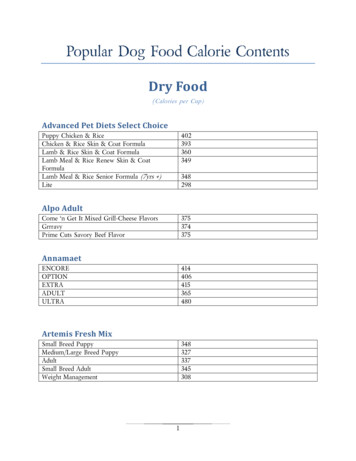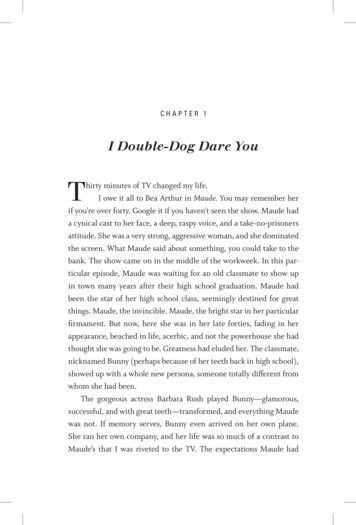
Transcription
Chapter 1I Double-Dog Dare YouThirty minutes of TV changed my life.I owe it all to Bea Arthur in Maude. You may remember herif you’re over forty. Google it if you haven’t seen the show. Maude hada cynical cast to her face, a deep, raspy voice, and a take-no-prisonersattitude. She was a very strong, aggressive woman, and she dominatedthe screen. What Maude said about something, you could take to thebank. The show came on in the middle of the workweek. In this particular episode, Maude was waiting for an old classmate to show upin town many years after their high school graduation. Maude hadbeen the star of her high school class, seemingly destined for greatthings. Maude, the invincible. Maude, the bright star in her particularfirmament. But now, here she was in her late forties, fading in herappearance, beached in life, acerbic, and not the powerhouse she hadthought she was going to be. Greatness had eluded her. The classmate,nicknamed Bunny (perhaps because of her teeth back in high school),showed up with a whole new persona, someone totally different fromwhom she had been.The gorgeous actress Barbara Rush played Bunny—glamorous,successful, and with great teeth—transformed, and everything Maudewas not. If memory serves, Bunny even arrived on her own plane.She ran her own company, and her life was so much of a contrast toMaude’s that I was riveted to the TV. The expectations Maude had
2 Texas Tenacitynourished had come to nothing. The expectations of Bunny, on theother hand, had been dismal; Maude was supposed to be the star. Yetlife had taken an unexpected turn. Bunny had changed; Maude hadn’t.I was in my late twenties working in a boring job in New York City,with no goal or vision of what should come next in my life.I realized that I was on the verge of becoming Maude. My parents had sacrificed to send me to an expensive school, and here I was,doing . . . what? Working in a job in the federal government where Iwas never going to do anything earthshaking.Some of my goals were strictly my own, some guidedby friends or external events, but in no case did Iever believe that because I was a woman, I wouldn’tbe able to achieve them—one way or another.The TV show woke me to the fact that I had to define my future. Noone else could do it for me. That thirty minutes made me determined Iwould avoid the Maude trajectory. The next morning, I telephoned theadministrator of the Law School Admission Test and signed up to takethe test, cramming over a two-week period before going up to ColumbiaUniversity for the exam. I received a good score, and I was admitted tothe University of Texas School of Law for the coming fall term.Maude made me realize that I not only had the power to changethe direction of my life, but that I had to do it. We have to will ourselves into our futures, even if at first, the future looks murky at best.In my own case, I would never have imagined, at the age oftwenty-one as a new college graduate, that I would go to law school;be a prosecutor; run for elected office multiple times statewide inTexas—and win; and also spend thirty years running a cattle operation during much of that same period. In the meantime, I married
I Double-Dog Dare You 3a wonderful man with whom I had three sons, now adults; wrote aromance novel, which caused consternation in some quarters; andlearned a lot about people. Lessons I still apply.Some of my goals were strictly my own, some guided by friends orexternal events, but in no case did I ever believe that because I was awoman, I wouldn’t be able to achieve them—one way or another.Other times I faced closed doors—not because ofbeing a woman, however—and either had to kickthem down or get another door to open.I just didn’t think about it. I am still not sure why that is. My parents weren’t intentionally or deliberately “pro-women” . . . they justwanted their two kids to be happy and succeed. My mother wasn’t afeminist; my father, as a rancher, was more concerned with rain andcattle than with my being a leader in any particular area. But togetherthey cultivated good instincts in me and laid down rules for life thatseem still relevant.Plain speaking was welcome in my world, as were humor, greatstories about individuals, and a love of language. These habits andbeliefs brought substantial success and fun and helped me conquerand overcome obstacles several times. Other times I faced closeddoors—not because of being a woman, however—and either had tokick them down or get another door to open. All of it was energizing!I retired from elected office in 2015 and projected that my next year orso was going to be calm, serene, perhaps even boring.A new Maude-type event occurred a year ago. In the spring of2015, I was jolted into a fresh awareness that society’s views on womenhad not materially advanced in many ways. What woke me up to thisfact? I really wonder why I hadn’t been noticing; perhaps because the
4 Texas Tenacityobstacles I encountered were the result of what I was trying to do, notthat I was a woman trying to do it. I suspect I was rather insular inthat regard.A recent Austin, Texas, city council election meant that therewould soon be a majority of women on the council. By way of context,Austin is well known as a liberal and forward-thinking city, even if noteveryone agrees with its path at a particular time.A male city staff member thought that this electoral shift was sosignificant that special training needed to be conducted to deal withthis remarkable occurrence. Women assuredly were different, weren’tthey? Needed special handling? Presumably their brains were different, since their bodies certainly were. And yet there had been femalecouncil members before. What had changed? To this day, no one canpinpoint a reason why this happened, but it is noteworthy.The male staff member hired a super special consultant team to dealwith this earthshaking event, for who knew what might happen if staffweren’t trained to deal with women! The result was probably not whathe wanted or had imagined by the end of the consultant’s contract.Here’s why.The male consultant began by describing his experience base forhow women learn, lead, communicate, and deal with issues—as ameans of demonstrating his expertise and showing how he could provide help. Are you ready? He told the city staff that women don’t likenumbers, and they also ask a lot of questions. Interesting. As proofof these unassailable “facts” about women, he offered an illustrationof the source of his experience and knowledge. Ready? He had beendriving his eleven-year-old daughter to school recently, and in the tenminutes or so of the drive, she asked a whole bunch of questions—which he “answered patiently.” Really?Two things horrified me about this scenario and his words and
I Double-Dog Dare You 5assumptions. First, he used an eleven-year-old girl as an example for thebest way to deal with adult women who are elected officials, who hadrun hard for their positions, and who had persuaded a majority of votersthat they were skilled and competent. But second, he prided himself onhis ability to answer “patiently” the questions from his daughter—hisfemale child, to belabor the point—as if he were sacrificing himself inoffering this remarkable service. On so many fronts, it was both a sadand frustrating commentary. It was also insulting and seemed to reinforce the stereotypes that are often repeated about women.By implication, the male city council members accept and believeeverything the staff tells them, never question any fact or conclusion,and vote in lockstep. Nice compliment for them, too! This all resulted inan uptick in national interest in Austin, with Conan O’Brien and a hostof others commenting about the situation on TV. Not really what youwant to be known for—either as a consultant or a forward-thinking city.But perhaps the most striking thing to me was that this took placein 2015, in Austin, not exactly a bastion of conservatism. The socialmedia lit up with people asking, “How on earth did the staff member,who hired the consultant, ever think this was appropriate?” I believehe is still employed by the city.I have to tell you it got me pretty fired up. Nothing about the entireepisode could pass muster on any account—not for women, or formen, or the assumptions and stereotypes that it perpetuated.I asked myself a few questions: “If this could happen in Austin,Texas, how pervasive is this? Why is this view of women still so prevalent? Why were we even in this situation in 2015—and what do we doabout it?” This last point made me decide to do something.We did some focus groups on the topic of how women perceivethemselves, and several things came out of that effort. First, themajority of the women expressed that they lacked self-confidence in
6 Texas Tenacitythe workplace. They didn’t feel comfortable asking for a raise. Theyweren’t sure they were ready for the next level in their career. However,they felt talking to other women was energizing, and they all enjoyedthe sense of community they derived from speaking to each other. Ata breakfast in Austin with about two hundred women in attendance,heads nodded all around the room as the three of us panelists talkedabout self-confidence. The word “confidence” spanned appearance,salary, life skills, future career, and the ability to get on or off the trackthey were on. It covered all areas of life. Except, interestingly, they allstated they felt most fulfilled in their home lives. Whether they hadchildren or were single and childless, and happy that way, by and largefelt they were “okay.”A recent lawsuit in the high-tech sector that garnered a lot ofattention concerned the case of whether or not a particular womanwas held back by her gender. The court found that she had been supported by males and that it was probably not her gender that slowedher upward progress. This lawsuit is an outlier as such lawsuits arepretty rare. From my observation, women are reluctant to rock anykind of boat, and a lawsuit is a very big, difficult vessel to manage.What also has cropped up over and over, whether in large meetingsor one-on-one conversations, is that women repeatedly state that theydon’t feel women encourage and support each other.And the perception of those of us who have achieved some levelof success is that the women coming behind us are not at all as faralong in terms of achievements as we would have imagined theywould be by now. I absolutely would have expected 2016 would haveseen full career equality if I had thought about it in the mid to lateseventies. That has to change. So now, in 2016, I am embarking on adefinite and deliberate mission: a mission to help women. This mission is taking two forms.
I Double-Dog Dare You 7Being pissed off is who I am andI embrace it—and use it for good.First, I decided to write Texas Tenacity to show how women canhave rich and varied lives if they recognize opportunity when itknocks. And if they come to a closed door, they have to learn how tounlock it, or they have to find a new door, or they have to work aroundthat door. Or they just have to plain kick it down. Basically, we womenhave the tools necessary—if we choose to use them.Second, we are launching a new website and social media effortcalled Herdacity, whose tagline is “Where Women Dare.” Maybe thisstrikes a chord with you, or maybe you’ll ask, “Dare what?” In part, it’sfor you to decide, based on where you are in life or where you want togo. Maybe you dare to be who you want to be. Dare to take a leap. Dareto express your opinions. Dare to change jobs. Dare to pursue yourdreams. Dare to embrace who you are. Defining the daring is up toyou, since each of us is different and unique. What we have is the unifying female gender bonding us to one another. We have a lot of workto do with the project, with its goal to educate and empower womenacross this country. I am really excited about it and look forward toseeing what we can accomplish—and how women choose to use theseresources to dare a bit more.Since you may not know me, let me return to my comment aboutbeing fired up. I had a wonderful business partner in the cattle business for over a decade, and one day he remarked idly that I was very“even-tempered.” I mentally preened over what I thought was an accolade. With a deadpan expression, he then added, “Yes, you are alwayspissed off.”So there you have it. Being pissed off is who I am and I embraceit—and use it for good. It is also what prompted this book and the
8 Texas Tenacitylarger Herdacity effort, as well as a few job choices, running for elective office, and speaking my mind—even when it was unpopular.Yes, I have dared in life, taken risks, fought and conquered nearlydebilitating fear, seized opportunities, and held optimism close. Withmy life’s pursuits, I have mostly focused on making a difference. I waspowered by a passion to make a change or to achieve a certain goal. Thisincudes a focus on protecting children, changing a few things in ourgovernment to make life better for the men and women in Texas, andnow to help one specific group—women. Although this boldness is athread that has run through most of my life, I didn’t always know it wasthere, or even how best to use it. But there are certain pivotal momentsalong the way that illustrate this determination and strength—and Ishare them with you in the hope you create a similar story of successand satisfaction and stand up and be who you want to be.I wasn’t particularly introspective in my girlhood, being more concerned with how others saw me and how I could and should fit into aparticular environment. But I now believe that women have to helpother women with advice, encouragement, and nudges—nudges thatsay to women, “Be who you want to be.” Not who others tell you to beor want you to be. Only then can the real you emerge.The pivotal moments that changed my life won’t be yours, but youwill have your own. Encouragement goes a long way to moving us alonglife’s path, and we have to dare to keep moving forward. I double-dogdare you to be the person you want to be!
I Double-Dog Dare You T hirty minutes of TV changed my life. I owe it all to Bea Arthur in Maude. You may remember her if you’re over forty. Google it if you haven’t seen the show. Maude had a cynical cast to her face, a deep, raspy voice, and a take-no-prisoners attitude. She was a ver

